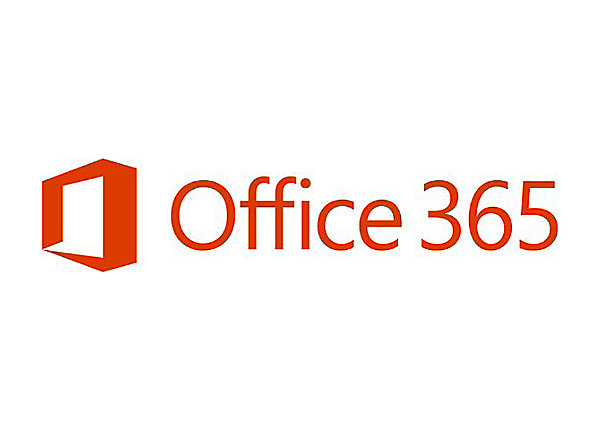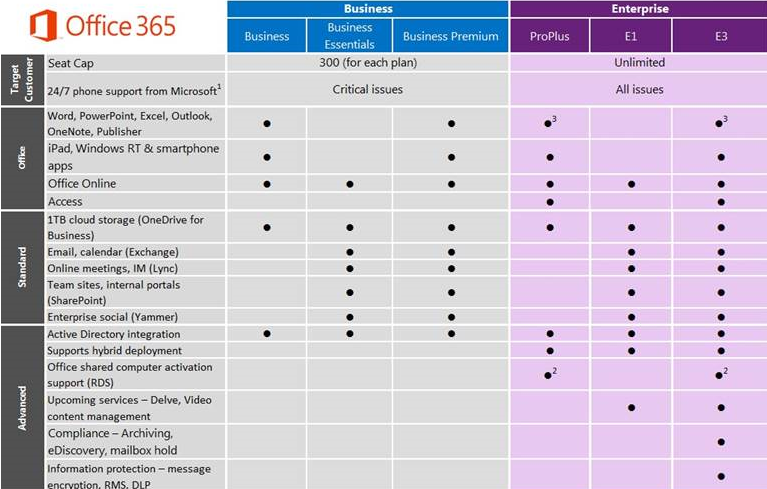At first glance, the various options of Microsoft Business plans can seem intimidating and confusing, therefore, allow me the opportunity to break down the differences in the 6 offers of business plans.

First of all, the 6 plans are divided into two big sectors known as Business and Enterprise. The main difference is that the Business sector is targeted towards smaller companies compared to Enterprise options. For example, in all Business plans, the cap for services offered to employees is 300 while Enterprise allows services to be granted to unlimited number of people in a company. In addition, while in the Business plans Microsoft only provide 24/7 customer support for critical issues, for the Enterprise editions, however, Microsoft provide phone support for all types of issues. From this perspective, Enterprise edition is more suitable for bigger companies with more needs than smaller companies who have under 300 people and do not need advanced services that are listed in the graph below.

Now, let’s break down each plan one by one and start with Business editions. While all plans under the Business edition has similarities such as 1 TB of cloud storage and active directory integration, there are, however, some significant differences in the three plans.
Business Edition Plans
In Office 365 Business (first blue column), Microsoft provides office applications such as Word, cloud file storage, and sharing. Business-class email, however, is not included. However, Office services are limited in this edition and only include One Drive. In addition, the Business plan costs $8.25 per user for a month based on an annual commitment.
The main difference between Business plan and Business Essential plan under the Business edition is that Business Essential plan targets Office Services that are more communication-oriented, such as OneDrive, Exchange, and Skype for Business. The Business Essential plan, however, does not include Office applications like Word and Powerpoint. This plan costs $5 per user for a month based on an annual commitment.
The Business Premium Plan (third blue column) simply includes the benefits of both Business plan and Business Essential plan, meaning that it includes both the Office services and applications. This plan costs $12.50 per user per month on an annual commitment.
Enterprise Edition Plans
The Enterprise Edition plans share many similarities such as unlimited seat cap and 24/7 phone support for all issues, there are, however significant differences among the many plans. The ProPlus plan contains all Office applications, however, unlike the other plans, only include two services which are OneDrive and Skype for Business. In addition, Business email is not included in this plan, and 1 TB is provided for OneDrive. As a result, this plan costs $12 per user per month on an annual commitment.
The Enterprise E1 plan, on the other hand, does not include the Office applications but contains the services, such as Microsoft Teams and Exchange (also mentioned in the Business edition). Like the previous plan, 1 TB is also provided for OneDrive. In addition, Email hosting is available with the limit of 50 GB mailbox and customized domain address. This plan costs $8 per user per month.
Enterprise E3 edition include both the applications and services. Furthermore, it has Email hosting with the limit of 100 GB mailbox and customized domain address. So if your company is big and is in need of large storage content and advanced support services, this version is recommended. It costs $20 per user per month on an annual basis.
Not on the chart above but available as an option is the plan Enterprise E5, which contains all of the services and applications included in Enterprise E3 but contains advanced security, analytics, and voice capabilities. This plan costs $35 per user per month.
And this concludes my brief introduction for all the available plans at Microsoft. For more details about the Business Edition, click here. For further details about the Enterprise Edition, click here. To discuss about best options for your organization, just contact Office 365 CSP Partner such as Netkiller.